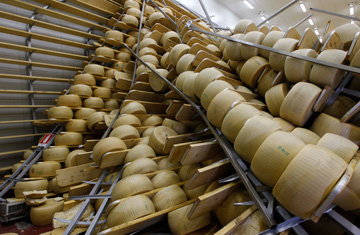
Overturned shelves with Parmesan wheels are seen in this Parmesan cheese factory in San Giovanni in Persiceto, Italy, Monday, May 21. 2012
Dante Caretti thought business was good until he woke to the crash of collapsing shelves in the rooms where he was aging 32,000 wheels of Parmesan cheese. The 5.9-magnitude earthquake that struck Italy's agriculturally rich Emilia Romagna region on Sunday killed at least seven people, displaced thousands of others, and reduced homes and historical monuments to rubble. For Caretti, it also meant his family's 84-year-old company could be out of 13 million euros ($16.6 million) worth of cheese that took two years to produce.
"We felt things were going well for the business and then the earth's force let itself be felt," Caretti, 70, a fourth-generation cheesemaker in the town of San Giovanni in Persiceto, tells TIME. "I'll have to fight the insurance company to recoup at least 50% of my loss. It's not like a car accident and you file a claim for 10,000 euros."
It's too early for the government to put a pricetag on the damage to businesses, churches, homes and cultural sites caused by the worst tremor to hit Italy since a 6.3-magnitude quake rattled the central Italian Abruzzo region in April 2009, killing more than 300 people. Just counting losses in the agriculture sector, however, the Coldiretti farmers' association said around 400,000 parmesan wheels were lost in Sunday's quake, as well as livestock and equipment, all valued at around 200 million euros ($250 million).
The timing of a natural disaster on this scale couldn't be worse. Italy's recession is worsening and the government has made deep cuts in spending to try to save money and slash the world's fourth-largest debt. Whatever faith Italians had in the interim government led by Prime Minister Mario Monti has also been drying up, as tax hikes and pension and labor reforms have come into effect and the unemployment rate has continued to rise. That anger was evident when Monti cut short his trip to the NATO summit in Chicago to visit the quake-damaged area in northern Italy. During a stop in the town of Sant'Agostino, where four factory workers were killed, he was greeted with jeers. "Thieves, shame, go home," a group of hecklers called out. "The state should help its citizens not its banks," one woman told Italy's Sky news channel.
"The country is pretty depressed and we need a series of good news to boost morale," says Giorgio Barba Navaretti, an economics professor at the University of Milan. "It's not a major earthquake, but given the fiscal condition of the Italian state, it's hard to see where the resources will be found (for disaster relief)." Navaretti says the government may choose to take advantage of a new law that allows it to raise funds for natural disasters by boosting taxes on diesel and gasoline. Italians tend to be generous during times of disaster, but a new fuel tax right before the country hits the road for summer vacation might test their solidarity.
Monti did declare a state of emergency on Tuesday, allowing him to release emergency funds to pay for feeding and housing the displaced. He's also considering suspending tax payments in the most-affected areas. But because Italy is carefully monitoring public spending, the government won't foot the bill for all the damage caused by the quake. This will be left to the individual businesses and households that suffered losses, even if banks have been extremely cautious — some critics say stingy — in extending credit to people. Edoardo Liuni, an equity analyst at the financial services firm Trading Room Roma, says this is a chance for Monti to regain public support by leaning on lenders to help victims get back on their feet. "There was a lack of government response in stimulating economic growth. Now it will be up to them to respond to the quake by opening lines of credit," he said.
Mirco Tartari, a 48-year-old farmer in the Emilia Romagna region, would agree. The quake nearly completely destroyed a 140,000-euro ($180,000) solar electricity plant he installed on his 49-acre fruit farm near the small medieval city of Ferrara. His business suffered a loss in 2011 and a hailstorm earlier this year killed about 40% of his crop, meaning 2012 will probably end badly, as well. Now, the very survival of his business is at risk and Tartari needs cash or he may have to call it quits. "It's almost impossible to get bank credit. I used almost all my credit for the solar plant," he tells TIME. "I'm afraid that things will go bad and I'll have to close the company."
